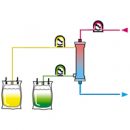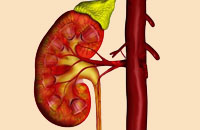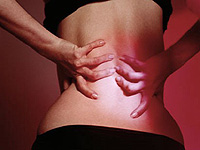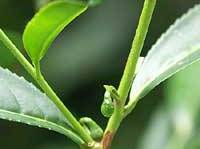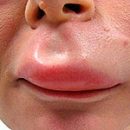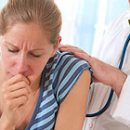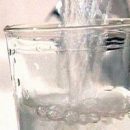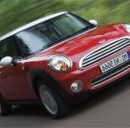Cystitis - inflammation of the mucous membrane of the bladder. Disease familiar to the majority of women, especially those who gone. The fact is that the female organism, due to some of his features, is more susceptible to the cyst larger than the male. So good if every woman will know in the face of this insidious «enemy».
Content
Most women at least once in their lives experienced such sensations as suddenly appearing frequent painful urination and pain in the bladder bladder. These are the most characteristic symptoms of acute cystitis — infectious inflammatory process in the wall of the bladder (mainly in the mucous membrane) — one of the most common urological diseases.
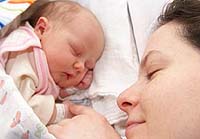 Intestinal wand, staphylococcus, streptococcus and other representatives of the conditionally pathogenic flora (bacteria, showing their pathogenic properties only when exposed to provoking factors) are most often. Often there are cystitis associated with ureaplasm, mycoplasma, chlamydia, trichomonas and mushrooms of the genus Candida.
Intestinal wand, staphylococcus, streptococcus and other representatives of the conditionally pathogenic flora (bacteria, showing their pathogenic properties only when exposed to provoking factors) are most often. Often there are cystitis associated with ureaplasm, mycoplasma, chlamydia, trichomonas and mushrooms of the genus Candida.
- During childbirth, the advancement of the fetus in generic paths leads to a violation of blood circulation in the bladder and a small pelvis, which is an additional predisposing factor in the occurrence of acute cystitis.
- According to the rules of childbirth, immediately after the birth of a child, a catheter is introduced to all women in the bladder, since the filled bladder interferes with a reduction in the uterus, catheterization can contribute to the penetration of the pathogen in the bladder.
- In the first few days after childbirth, there may be lack of urges on urination as a result of the compression of the nerve endings innervating the bladder during childbirth. In view of this, the guinea is recommended to empty the bladder every 2 hours. If a young mother forgets about it, a large amount of urine accumulates, which is also a predisposing factor for the inflammation of the bladder.
- Traditionally, the occurrence and exacerbation of cystitis are associated with supercooling. And indeed, the supercooling causes a decrease in the body's stability to diseases, especially local immune response, as a result of which infection actively multiplies and enters the bladder, causing an inflammatory response. The hypoint can contribute to the use of ice bubble in the postpartum period. However, it should be noted that the use of ice bubble, which stimulates the cutting of the uterus after delivery, as well as the bladder catheterization, are necessary measures for the prevention of such a formidable complication, as postpartum bleeding due to insufficient contraction of the uterus. In compliance with all the prevention measures, which will be discussed below, these necessary medical measures will not lead to the emergence of cystitis.
- Immediately after birth in the body, a young mother occur significant changes in the hormonal background (hormones that support pregnancy disappear, which affects the state of the immune system, local protection mechanisms and is a predisposing factor for the development of cystitis.
- During childbirth, blood loss is more or lesser, which also reduces the body's protective forces.
- Another major factors predisposing to the emergence of cystitis after delivery is the presence of an infection in the vagina during pregnancy, ignoring the recommendations for the treatment of infections.
How cystitis is manifested
The inflammation of the bladder is manifested primarily by the participation of urination. At the same time, the woman constantly arises strong uiles to visit the toilet, which do not correspond to the number of urine released. Often a woman notes pain at the end of urination, sometimes blood appears in the urine. Pretty often pain (a feeling of burning, cutting) can accompany the entire act of urination. In this case, they talk about the occurrence of urethrit — Inflammation of the urethra. In acute cystitis, pain appears at the bottom of the abdomen. Due to the advent of unbearable urination urination, false urinary incontinence may occur — Such a condition in which the woman feels a call, but does not have time to reach the toilet. This state is reversible, it passes after the cure of the disease.
Complications of cystitis
Under adverse conditions, cystitis may complicate. At the same time, the causative agents fall into the kidney, which leads to the development of acute pyelonephritis — Nonspecific infectious inflammation of a cup-making system and kidney parenchyma. Microorganisms can get into the kidney in two ways:
- through blood vessels (hematogenous way);
- In the development of / presence of bubble-ureteral reflux — Reverse cast of urine from bladder in ureter, kidney — Ascending path of infection (the so-called reflux — pyelonephritis).
Characteristic manifestations of acute pyelonephritis are a sudden increase in body temperature to 38-39 degrees and above, accompanied by «Stunning» chills. Often patients complain of pain in the lumbar region, nausea, vomiting. It is important to remember that acute pyelonephritis is emergency pathology and direct indication for hospitalization in the hospital. Therefore, even with a single episode of increasing body temperature up to the specified numbers with chills, which flows against the background of symptoms of acute cystitis, especially in the postpartum period, it is necessary to be hospitalized in an emergency hospital.
Diagnosis of cystitis
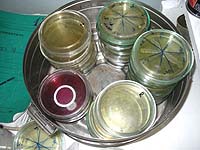 In the overwhelming majority of cases, the diagnosis of acute cystitis does not cause difficulties, since the symptoms of the disease is very specific. However, to confirm the diagnosis, it is necessary to pass the urine analysis, in which an increased number of leukocytes will be detected and the identification of red blood cells.
In the overwhelming majority of cases, the diagnosis of acute cystitis does not cause difficulties, since the symptoms of the disease is very specific. However, to confirm the diagnosis, it is necessary to pass the urine analysis, in which an increased number of leukocytes will be detected and the identification of red blood cells.
To assign the correct antibiotic therapy, you need to make a microbiological analysis of urine, which allows you to identify the sensitivity of the pathogen to one or another antibiotic (the urine is placed on a special nutrient medium where microorganisms that cause cystitis are growing, after that they investigate the sensitivity of microbes to antibiotics). As instrumental methods of examination in acute cystitis, an ultrasound examination and cystoscopy can be applied (research during which with the help of a special device — Cistosobop — inspect the eye of the bladder and urethra). However, the survey is most often limited to the study of these laboratory tests.
It is very important that in the course of the survey a woman suffering from cystitis passed the tests to judge the state of the marginal microflora and the availability of sexually transmitted infections.
Treatment cystitis
Antibacterial drugs and solarges are traditionally used for the treatment of cystitis. The doctor will select such a drug whose application does not exclude breastfeeding.
Also used local therapy, consisting in instillations, t.E. In the introduction of special solutions containing various medicinal substances that have antimicrobial effects in the bladder.
In parallel, bacterial vaginosis and sexually transmitted infections are carried out.
To prevent repeated episodes of acute cystitis when the first signs of the disease, it is necessary to visit the urologist and the gynecologist and conduct a prescribed treatment in full.
Prevention of cystitis
- Exclude hypothermia, for this while walking with the baby dress up the weather.
- Even during pregnancy, and better — Before it, you should take care of the treatment of chronic inflammatory diseases: chronic tonsillitis, carious teeth and t.D., Since the sources of chronic infection provoke the occurrence of foci of inflammation in other organs, including in the bladder.
- During, and better — Before pregnancy, it is necessary to cure bacterial vaginosis and sexually transmitted infections.
- Wake up after each urination and defecation. If there is no such possibility, when visiting the toilet, roll only by movements in front of the back and in no way vice versa.
- It is necessary to ensure that the chair was regular, there were no constipation, as constipation also predispose to the Colest due to circulatory disorders in the bodies of the small pelvis.
- Change hygienic pads every 2 hours.
- Follow your diet: After childbirth, you should not use anything acute, sour, roasted, spicy, salt, pickled, not to mention alcohol.
Observing these conditions, you will ensure not only the prevention of cystitis, but also successful breastfeeding.

